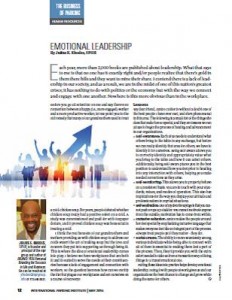Each year, more than 2,000 books are published about leadership. What that says to me is that no one has it exactly right and/or people realize that there’s gold in them there hills and they want to mine their share. I contend there is a lack of leadership in our society, and as a result, we are in the midst of one of this nation’s greatest crises; it has nothing to do with politics or the economy but with the way we connect and engage with one another. Nowhere is this more obvious than in the workplace.
Before you go all scientific on me and say there’s no connection between a happy (i.e., more engaged) worker and a more productive worker, let me point you to the old remedy that many of our grandmothers used to treat a cold: chicken soup. For years, people debated whether chicken soup really had a positive effect on a cold. A study was commissioned and paid for with taxpayer dollars, and it proved chicken soup was beneficial in treating a cold.
I think the real benefits of our grandmothers and mothers providing us with chicken soup to address our colds wasn’t the act of making soup but the love and concern they put into supporting us through being ill. This is where the idea of emotional leadership comes into play. I believe we have workplaces that are both ill and ill-suited to serve the needs of their constituencies because a lack of engagement and connection with workers. So the question becomes how can we rectify the ills that plague our workplaces and set ourselves on a course of recovery?
Lessons
My dear friend, Janice Collier is without a doubt one of the best people I have ever met, and she’s phenomenal in this area. The following is a small list of the things she does that make her so special, and they are lessons we can all use to begin the process of healing and advancement in our organizations.
Self-Awareness: Each of us needs to understand what others bring to the table in any exchange, but before we can really identify that area for others, we have to identify it for ourselves. Being self-aware allows you to correctly identify and appropriately value what you bring to the table and how it can affect others. Additionally, being self-aware places you in the best position to understand how you feel prior to heading into any interaction with others, helping you make needed corrections as they arise.
Self-Monitoring: This allows you to properly behave on a consistent basis. You are in touch with your standards, values, and modes of operation. This also has implications for the way you display your attitude and professionalism in myriad situations.
Self-Motivation: One of my favorite sayings is that you can-not push a rope up a ladder. You cannot motivate anyone from the outside; motivation has to come from within.
Inclusive Behavior: Janice makes the people around her feel special by emphasizing inclusive language that makes everyone feel like an integral part of the process. Always treat people as if they matter—they do!.
Social Graces: The ability to move seamlessly among various individuals while being able to connect with all of them is essential to making them feel a part of the process. Then, they’ll provide you with the extra effort needed to take us from a transaction way of doing things to a transformational one.
Putting these ideas into practice helps develop emotional leadership. Doing it with people at work gives us and our organizations the best chance to change and grow while doing the same for others.
Julius E. Rhodes, SPHR, is founder and principal of the mpr group and author of BRAND: YOU Personal Branding for Success in Life and Business. He can be reached at jrhodes@mprgroup.info or 773.548.8037.
TPP-2015-05-Emotional Leadership

